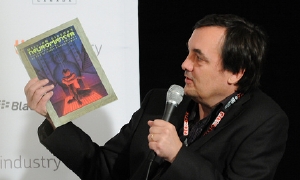 Underground cinema movie gangsters at Quiet Earth have just, no pun intended, unearthed a CD-length TIFF Nexus panel discussion with Vincenzo Natali (writer/director of Neuromancer), Jay Firestone (producer), Francesca Accinelli (director for Canada Media Fund’s English Market) and Trevor Fencott (president/CEO of Bedlam Games) about Neuromancer as a film and a game project. If you’re interested in the whole discussion, head over to Quiet Earth for all the seventy-something minutes of goodness, if you’re short on time, come on in to read the most important facts we’ve gathered.
Underground cinema movie gangsters at Quiet Earth have just, no pun intended, unearthed a CD-length TIFF Nexus panel discussion with Vincenzo Natali (writer/director of Neuromancer), Jay Firestone (producer), Francesca Accinelli (director for Canada Media Fund’s English Market) and Trevor Fencott (president/CEO of Bedlam Games) about Neuromancer as a film and a game project. If you’re interested in the whole discussion, head over to Quiet Earth for all the seventy-something minutes of goodness, if you’re short on time, come on in to read the most important facts we’ve gathered.
The TIFF Nexus panel was mostly concentrating on business, marketing and production, so little was unearthed about characters and cast and much bullshit was spread evenly on participants (obviously, little can be unveiled at this point), still, eager afficionados will be interested what we could pick up, which is more or less as follows:
- The sky above the port was the color of television tuned to a dead channel. The legendary opening sentence is taken out of the storyboard and the action notes and is not even reflected visually.
- One of Gibson’s regrets about Neuromancer is that he didn’t predict cellphones. Still, the script changed the whole phone booth scene with cellphones ringing around Case instead of booth phones ringing as he passes by.
- As for changes, Gibson participates in the scriptwriting phase with Natali, changes only small details, is content with the bigger changes the director did and gives quite a free hand in changing the bigger things
- The Matrix poses a challenge to the Neuromancer movie – it’s introduced the high-concept cyberpunk world with virtual reality and on-the-edge characters which poses a problem to pitching it to investors. Natali calls this movie “the science fiction French Connection”
- Natali is not yet ready to talk about how cyberspace looks like in his film but he said the following: basically there are two distrinct representations of cyberspace. The first is similar to what you’ve seen in the Matrix, a VR that mimics our own and the second one is a Euclidean cityspace, much like Tron. What Natali tries to introduce is an extrapolation, a domain of AI intelligences, that’s the distinguishing feature. Where this kind of new cyberspace leads us is not necessarily friendly for human beings, it’s a rough ride that only certain people can undertake. A very trippy grey line between what gets generated by your consciousness and what exists as an empirical cyberreality. It’s going to be complicated, messy and sophisticated.
- Neuromancer as a one-off? Not at all, says Natali, who believes that what Neuromancer represents is a conceived, deep and complex thing and franchise media will spread to other platforms, so when the movie and the game are made, that’s just going to be the beginning of something. (Note: Natali directly expressed he wouldn’t like to see the word franchise connected to this project but as this whole panel talk was on the professional side, business/transmedia ideas further contributed to Neuromancer fleshed out as a film/game/comics/apps thing.) Jay also noted that Gibson offered other properties to him on a loyalty base.
- Will the movie be a stereoscopic one? Natali likes 3D but he believes that the technology isn’t there yet, glasses don’t work that well and don’t enhance the experience. Furthermore, it’s virtually doubling the production costs. Still, there are discussions about it and lots of decisions might be made over his head.
- Del Rey wants to relaunch the comics book, also Jay noted that it failed so much that something like six copies were sold altogether. The number is quite low but we get the picture (check out the Neuromancer graphics novel at antonraubenweiss.com)
- There are currently talks about a Neuromancer prequel that would introduce the high concepts and the universe depicted in Neuromancer for the Twilight-age teenager crowd.
- As for the game design part, what we’ve gathered is that it might be an open-ended persistent game world not unlike an MMO with a separate storyline (with stories born inside that game environment, that’s quite a cue). Technologywise it’s going to be innovative, big and it needs a lot of scientific expertise and existing game technologies will be used in a new way. (Nothing getting out of it.) As for how cyberspace is going to look like in the game world, Trevor noted that it’s going to be more like an experiential than a visual thing, as nowadays gamers are basically living a cyberspace experience when they’re gaming.